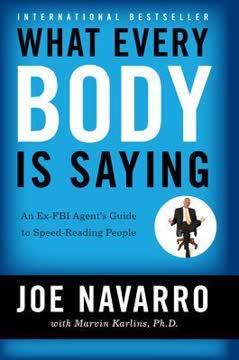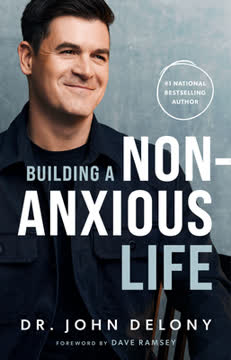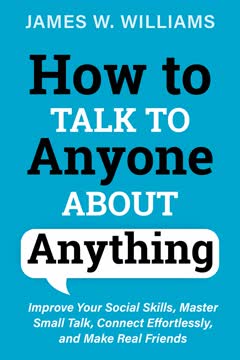Key Takeaways
1. Develop Your Sense of Self to Build Authentic Relationships
"Your sense of self is everything. It defines you."
Self-awareness is foundational. Understanding your beliefs, values, and purpose in life is crucial for authentic communication. Without a strong sense of self, you may find yourself drifting through life, uncertain and indecisive. To develop self-awareness:
- Reflect on your values, passions, and goals
- Identify your strengths and areas for improvement
- Consider how you want to be perceived by others
Authenticity breeds connection. When you know yourself, you can confidently share your opinions and engage in meaningful conversations. This authenticity allows others to connect with the real you, fostering deeper relationships.
2. Master the Art of Active Listening for Deeper Connections
"When you talk, you are only repeating what you already know. But if you listen, you may learn something new." — Dalai Lama
Listening is a skill to be honed. Active listening involves giving your full attention to the speaker, understanding their message, and responding thoughtfully. To improve your listening skills:
- Minimize distractions and focus on the speaker
- Make eye contact and use open body language
- Avoid interrupting or planning your response while others are speaking
Empathy enhances understanding. By truly listening, you gain clarity on what others are saying and feeling. This deeper understanding allows you to respond more effectively and build stronger connections.
3. Ask Powerful Questions to Guide Conversations
"At the end of the day, the questions we ask of ourselves determine the type of people that we will become." — Leo Babauta
Questions shape conversations. The right questions can guide a dialogue, uncover common ground, and create opportunities for deeper connection. To ask better questions:
- Use open-ended questions to encourage elaboration
- Focus on the other person's interests and experiences
- Avoid judgmental or overly personal questions early in a relationship
Curiosity fuels engagement. Demonstrating genuine interest in others through thoughtful questions makes them feel valued and understood. This curiosity can lead to more meaningful and memorable interactions.
4. Transform Small Talk into Engaging Dialogues
"Small talk is the biggest talk we do." — Susan RoAne
Small talk is a gateway. While often dismissed as superficial, small talk serves as an important social lubricant and entry point for deeper conversations. To elevate small talk:
- Start with common topics like the immediate environment or shared experiences
- Look for opportunities to transition to more substantive subjects
- Show genuine interest and enthusiasm in the conversation
Build rapport gradually. Meaningful relationships take time to develop. Use small talk as a foundation to establish trust and find common ground before delving into more personal or complex topics.
5. Cultivate Charisma Through Genuine Enthusiasm and Energy
"Charisma is a sparkle in people that money can't buy. It's an invisible energy with visible effects." — Marianne Williamson
Enthusiasm is contagious. Bringing positive energy and genuine interest to your interactions can make you more magnetic and memorable. To cultivate charisma:
- Express passion for topics you care about
- Use animated body language and vocal variety
- Focus on making others feel important and valued
Authenticity trumps perfection. True charisma comes from being genuinely yourself, not trying to imitate others. Embrace your unique qualities and let your authentic personality shine through.
6. Build Confidence Through Body Language and Mindset Shifts
"The most beautiful thing you can wear is confidence." — Blake Lively
Body language speaks volumes. Your nonverbal cues can significantly impact how others perceive you and how you feel about yourself. To project confidence:
- Stand tall with good posture
- Make appropriate eye contact
- Use open gestures and avoid defensive postures
Mindset matters. Confidence is as much internal as it is external. To build inner confidence:
- Challenge negative self-talk
- Celebrate your strengths and accomplishments
- Practice self-compassion and embrace imperfection
7. Craft Captivating Stories to Leave Lasting Impressions
"Inside each of us is a natural-born storyteller, waiting to be released." — Robin Moore
Stories create connection. Well-told stories can captivate audiences, convey important messages, and make you more memorable. To improve your storytelling:
- Structure your stories with a clear beginning, middle, and end
- Include vivid details and emotions to bring your stories to life
- Practice telling your stories to refine your delivery
Find stories in everyday life. You don't need extraordinary experiences to tell great stories. Look for interesting moments in your daily life and practice framing them in engaging ways.
8. Expand Your Horizons to Become a More Interesting Person
"Your life is your canvas, and you are the masterpiece. There are a million ways to be kind, amazing, fabulous, creative, bold, and interesting." — Kerli
Curiosity breeds interest. Actively seeking new experiences and knowledge makes you a more engaging conversationalist and interesting person. To expand your horizons:
- Read widely across various subjects
- Try new hobbies or activities
- Travel and expose yourself to different cultures
Invest in personal growth. Continuously learning and challenging yourself not only makes you more interesting but also leads to a more fulfilling life. Set goals for personal development and pursue them with passion.
Last updated:
FAQ
1. What is "How to Talk to Anyone About Anything" by James W. Williams about?
- Comprehensive Social Skills Guide: The book is a practical guide to improving social skills, mastering small talk, connecting effortlessly, and making real friends.
- Step-by-Step Approach: It covers everything from building self-confidence and understanding yourself to advanced conversation techniques and relationship-building.
- Actionable Advice: The author provides exercises, real-life examples, and actionable tips to help readers practice and implement the skills discussed.
- Focus on Connection: The central theme is that meaningful relationships and effective communication are essential for happiness and success.
2. Why should I read "How to Talk to Anyone About Anything" by James W. Williams?
- Overcome Social Anxiety: The book is ideal for anyone who feels shy, awkward, or anxious in social situations and wants to become more confident.
- Practical, Real-World Tips: It offers actionable strategies that can be applied immediately in everyday life, from work to dating to making new friends.
- Personal Growth: The author shares his own journey from social anxiety to social confidence, making the advice relatable and encouraging.
- Universal Relevance: Whether you want to improve your professional networking, deepen friendships, or simply feel more at ease in conversations, the book provides tools for all scenarios.
3. What are the key takeaways from "How to Talk to Anyone About Anything" by James W. Williams?
- Self-Awareness is Foundational: Developing a strong sense of self and understanding your values is the first step to confident communication.
- Listening is Crucial: Active, empathetic listening is more important than speaking and is the basis for all meaningful conversations.
- Questions Drive Connection: Asking open-ended, thoughtful questions is the best way to guide conversations and build rapport.
- Practice Makes Perfect: Social skills, like any other, require consistent practice, self-reflection, and a willingness to step out of your comfort zone.
4. How does James W. Williams define and develop a "sense of self" in "How to Talk to Anyone About Anything"?
- Beyond Surface Identity: Williams encourages readers to look past basic identifiers (name, job, age) and explore deeper beliefs, values, and passions.
- Self-Reflection Exercises: The book provides journaling prompts and questions to help readers clarify who they are and what they want.
- Authenticity is Key: A well-developed sense of self allows you to be authentic in interactions, which naturally boosts confidence and connection.
- Continuous Process: Developing your sense of self is ongoing and evolves with new experiences and self-discovery.
5. What listening skills and techniques are emphasized in "How to Talk to Anyone About Anything" by James W. Williams?
- Active Listening: Focus on listening to understand, not just to respond, by giving your full attention and minimizing distractions.
- Body Language Matters: Use eye contact, open posture, and nodding to show engagement and encourage openness.
- Clarification and Reflection: Repeat back key points, paraphrase, and ask clarifying questions to ensure understanding and make the speaker feel heard.
- Non-Judgmental Attitude: Avoid making judgments or interrupting, and strive to be open-minded and accepting of different perspectives.
6. How does "How to Talk to Anyone About Anything" by James W. Williams teach the art of asking questions?
- Purposeful Questioning: Use questions to direct the conversation, gain clarity, and show genuine interest in the other person.
- Open-Ended Over Closed: Favor open-ended questions (using "what," "how," "who") to encourage detailed responses and deeper discussion.
- Avoid Interrogation: Balance asking questions with sharing about yourself to prevent the conversation from feeling like an interview.
- Adapt to Context: Tailor your questions to the situation, social hierarchy, and the comfort level of the person you're speaking with.
7. What step-by-step method does James W. Williams recommend for starting and maintaining conversations in "How to Talk to Anyone About Anything"?
- First Impressions Count: Pay attention to your appearance, body language, and the energy you bring into a room.
- Read and Write the Room: Observe others’ cues and adjust your approach accordingly; be mindful of how you present yourself.
- Break the Ice: Use simple, context-appropriate openers or questions to initiate conversation without pressure.
- Find Common Ground: Listen for shared interests or experiences and vocalize your agreement to build rapport.
- Use Mirroring: Subtly mirror the other person’s body language and tone to foster connection and comfort.
8. How does "How to Talk to Anyone About Anything" by James W. Williams help readers master small talk?
- Four Foundations: The book highlights asking questions, active listening, minimizing distractions, and showing enthusiasm as the pillars of small talk.
- Bring Energy and Passion: Even mundane topics become engaging when approached with genuine enthusiasm and interest.
- Topic Suggestions: Williams provides a variety of safe, engaging small-talk topics (e.g., environment, hobbies, travel) and warns against sensitive or divisive subjects.
- Practice and Patience: Encourages readers to seek out opportunities for small talk, treat strangers as friends, and be patient with their progress.
9. What does "How to Talk to Anyone About Anything" by James W. Williams say about developing charisma and confidence?
- Charisma is Learnable: Charisma is not innate; it’s about managing nerves, being relatable, and making others feel valued.
- Confidence Through Action: "Fake it ‘til you make it"—acting confident helps you become confident, supported by psychological principles.
- Body Language and Eye Contact: Confident posture, expressive gestures, and steady eye contact are essential for projecting confidence.
- Giving Mindset: Charismatic people focus on giving—attention, compliments, and support—without expecting anything in return.
10. How does James W. Williams teach storytelling in "How to Talk to Anyone About Anything"?
- Everyone Has Stories: The book dispels the myth that only extraordinary lives make for good stories; everyday experiences can be compelling.
- 1:1:1 Method: For short stories, include one action, one-sentence summary, and one emotion to make stories concise and relatable.
- Structure for Impact: Use a clear structure (introduction, conflict, consequences, resolution, aftermath) to make stories engaging and memorable.
- Practice and Personalization: Keep a mental or written bank of stories, practice telling them, and tailor details to your audience for maximum effect.
11. What advice does "How to Talk to Anyone About Anything" by James W. Williams give for becoming a more interesting person?
- Pursue New Experiences: Try new hobbies, volunteer, travel, and break out of routine to gather stories and insights.
- Read and Learn: Reading widely expands your knowledge base and provides more topics for conversation.
- Invest Time Wisely: Be mindful of how you spend your time, focusing on activities that enrich your life and make you happier.
- Embrace Fear: Step through discomfort and try things that scare you; growth and interesting experiences often lie on the other side of fear.
12. How does "How to Talk to Anyone About Anything" by James W. Williams guide readers in developing meaningful relationships?
- Quality Over Quantity: Deep, meaningful relationships are more fulfilling than having many superficial acquaintances.
- Time and Support: Invest time in others, create shared experiences, and support friends through challenges to strengthen bonds.
- Be Yourself: Authenticity is crucial; meaningful relationships are built on honesty and acceptance of each other’s true selves.
- Understand Barriers: Recognize and overcome obstacles like technology distractions and busy schedules to prioritize real connection.
Bonus: What are the best quotes from "How to Talk to Anyone About Anything" by James W. Williams and what do they mean?
- “Your connection to other people is everything.” – Emphasizes that relationships are central to happiness and fulfillment.
- “Confidence and charisma are skills that can be learned, honed, and practiced.” – Encourages readers that social abilities are not fixed traits but can be developed.
- “When you talk, you are only repeating what you already know. But if you listen, you may learn something new.” — Dalai Lama – Highlights the importance of listening over speaking.
- “Small talk is the biggest talk we do.” — Susan RoAne – Reminds us that small talk is foundational to all relationships and opportunities.
- “A person’s name is the sweetest sound in the world to that person.” — Dale Carnegie – Stresses the power of remembering and using people’s names to build rapport.
Similar Books










Download PDF
Download EPUB
.epub digital book format is ideal for reading ebooks on phones, tablets, and e-readers.










